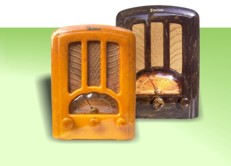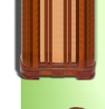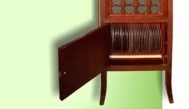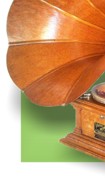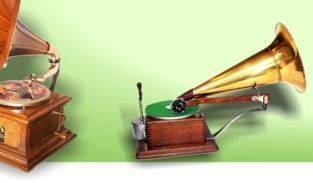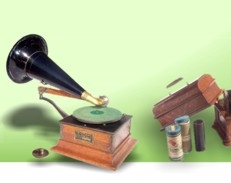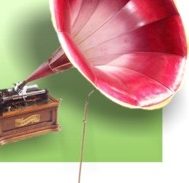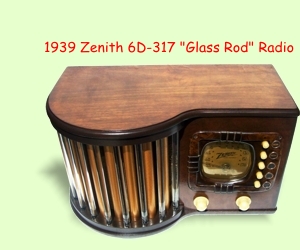|
In a Nutshell
Restored, working and sitting on an unauthentic but gorgeous blue mirror "Plateau"
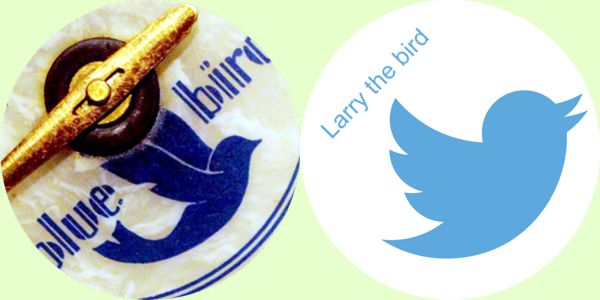
Introduction:
Radios all along were among the articles of daily life favored by industrial designers. Artists like Norman Bel Geddes [1893-1958], Serge Chermayeff [1900-1996], Wells Coates [1895-1958], Harold van Doren [1895-1957], Raymond Loewy [1893-1986], Count Alexis de Sakhnoffsky [1901-1964], Walter Dorwin Teague [1883-1960] and John Vassos [1898-1985] created classical tube radio cabinets of incredible beauty, often later re-created as transistorized replicas. Sparton (Sparks-Withington Co. of Jackson, Michigan) was leading the way using not only wood and bakelite, but also exotic materials like glass, chrome, catalin and Cloisonné for cabinet design. Sparton unveiled to the world at the New York National Electrical and Radio Exposition on September 18th, 1935 a series of midnight blue and old rose (peach or copper) glass mirror radios designed by Walter Dorwin Teague such as the Nocturne 1186 and Bluebird 566 models, followed by the 3-knob Sled 557 in 1936, the deLuxe 4-knob Sled 558, and the 7-sided 409GL in 1938. "Dean of Design" Teague in 1944, co-founded and presided the Society of Industrial Designers (SID), predecessor of today's Industrial Designers Society of America (IDSA) (youtube trailer in ref.5).
The Bluebirds |
| Manufacturer |
Model |
Year |
Tubes |
Mirror dia. |
Chromed pcs |
Dial |
Ball feet |
Knobs |
Tape |
Radio |
Speaker, ... |
| Sparton USA |
566 |
1935 |
5 (AA5) |
14¼" |
7 steel |
2 globes |
black |
silver |
no |
BC/SW |
front resistive cord |
| Sparton of Canada |
154B |
1935 |
5 +transf. |
14¼" |
7 steel |
blue bird |
black |
black |
no |
BC |
top, transformer |
| Thomas America Corp |
TPC-109 |
1990's |
no |
16½" |
1 plastic |
1 globe, Thomas |
silver |
silver |
yes |
BC/FM |
top |
| Crosley |
CR-37 |
1990's |
no |
14¼" |
1 plastic |
(1 globe), (Crosley) |
silver |
silver |
yes |
BC/FM |
left side |
| Crosley |
CR-81 |
1990's |
no |
8" |
1 plastic |
Crosley |
silver |
silver |
no |
BC/FM |
front |
| TSM Electr. France |
AR-50 |
1994 |
no |
15" |
1 plastic |
1 globe |
black |
silver |
no |
BC/LW/FM |
top |
| Spirit of St. Louis |
LW-119 |
1990's |
no |
16½" |
1 plastic |
Spirit of St. Louis |
silver |
silver |
no |
BC/FM |
left |
Taking pictures of these mirror radios is challenging, when trying to avoid reflections in their mirrors, but fun when trying the opposite. The Bluebird is American streamline art deco at its best, the front view most likely suggesting a triplane approaching from a blue heaven - but you make your choice. In contemporary ads (pict.43) the radio sits on a "plateau", matching the 14" diameter front mirror. This was an option for a "small extra cost". The few plateaus sold and even fewer surviving are amazingly rare in decent condition, but fortunately most Bluebird replicas sport an almost identical front mirror, that is made from the same blue tinted glass (see above table). I sacrificed a 1997 Crosley CR-37 (like in pict.56), to harvest its front mirror, which looks to be more expensive to make than the original, having 8 holes instead of one. A perfect plateau, perfectly matching the midnight blue of the original, and the radio perfectly concealing the holes, 4 of which are used to feed through 4 wooden stilts, to take the radio's weight off the mirror (picts.47-49). I had bought two CR-37, which had quite different hues of blue. The paler one is now for sale too (pict.56).
The radio offered here is the very rare Sparton of Canada version model 154B, that favorably differs from the US model 566: a larger cabinet accommodating a chassis with a life-saving isolating transformer (electrical hazards detailed in ref.s 4) and an unobstructed speaker on top, no "curtain burner" resistive power cord and ebonized wooden knobs matching the two ball feet. Even the dial is different, the Canadians showing a lovely little blue bird, somehow resembling Larry, the Twitter bird. I am not sure if the Canadian version ever was offered with this plateau, and I did not find any evidence for a model 154C (C for copper), that would be the Canadian equivalent of the US "Peachbird" with an "old rose" colored mirror. A 154C would have to have a dial with the writing Bluebird replaced by something else. Peachbirds obviously mutated with time from rose to dull peach, a chemical effect known also from contemporary Telechron glass mirror clocks (ref.7). A peachbird recently was sold by Steven Turner for $9230 (ref.8), and a pair in blue and peach is for sale for $40,000 (ref.9). Although peach is much rarer I personally decidedly prefer blue to peach.
Additional information:
ref.1: https://antiqueradio.org/spar04.htm
ref.2: http://www.tuberadioland.com/sparton566bluebird_main.html
ref.3: https://www.radiomuseum.org/r/spartoncan_154.html
ref.4: http://www.daads.org/modern/1401/sparton.htm , http://www.tuberadioland.com/sparton409GL_main.html
ref.5: https://www.youtube.com/watch?v=ksAKWce8cVQ (Teague)
ref.6: https://www.youtube.com/watch?v=GehUW8mYPb8 (mine)
ref.7: http://www.telechron.net/goldenage/3f65.htm
ref.8: https://www.ebay.com/itm/282862471355
ref.9: https://www.ebay.com/itm/322415544377
About my Radio:
My radio is in near mint condition, with only minimal imperfections on its original mirror and on the chrome parts. I had to make one new knob, complete with metal insert and set screw (don't ask me which one it was), and the two ball feet. The wooden parts of the cabinet have their original finish. The chassis (picts.27-38) has no corrosion, and is partially recapped, keeping the defunct filter caps in place for cosmetic reasons. The original speaker (picts.39-41), Bluebird dial and dial lens are perfect too. The radio has its original cloth-covered power cord and plug. A 3.5 mm closed circuit phone plug has been installed using shielded cables, to play back modern devices (picts.34-36). A blue mirror plateau has been made from the front mirror of a Crosley CR-37 replica, by putting it with felt padding in between onto a thin plywood circle of same size of 14", using four of the 8 holes to feed through 4 wooden stilts, on which the radio is positioned, not exhibiting any pressure on the plateau itself (picts.44-49). The radio plays fine as demonstrated in a youtube video (ref.6, or click on pict.55). Please
e-mail me (Kris) for any questions, ich spreche Deutsch, je parle Français.
The Bluebird as movie prop: The Bluebird appears in at least two movies: the 1936 film "Born To Dance", with Virginia Bruce as Lucy James and James Stewart as Ted Barker, when she sings "I've Got You Under My Skin" (pict.53), and in "Godfather (I)" in a scene where Carlo Rizzi, played by Gianni Russo beats up his wife Connie Corleone, played by Talia Shire, who demolishes a lot of dishes and china (pict.54); the radio hopefully survived. It looks not authentic though, having the shape of the US model 566, but with black Canadian knobs. The Godfather (I) is a 1972 American crime film directed by Francis Ford Coppola with Marlon Brando and Al Pacino.
|



